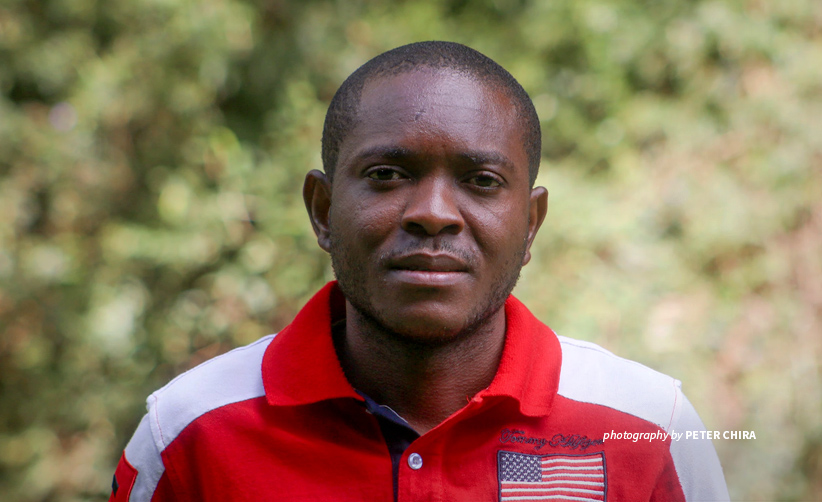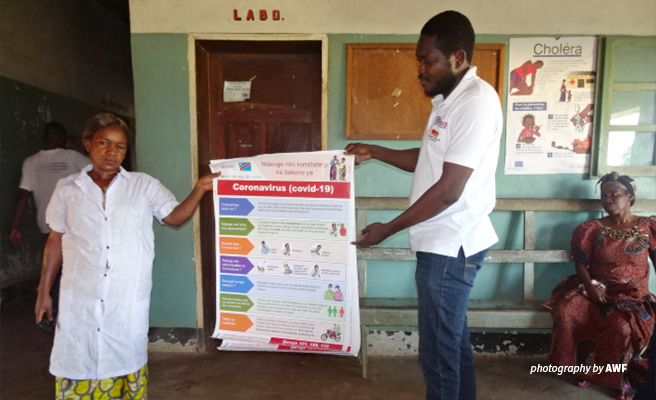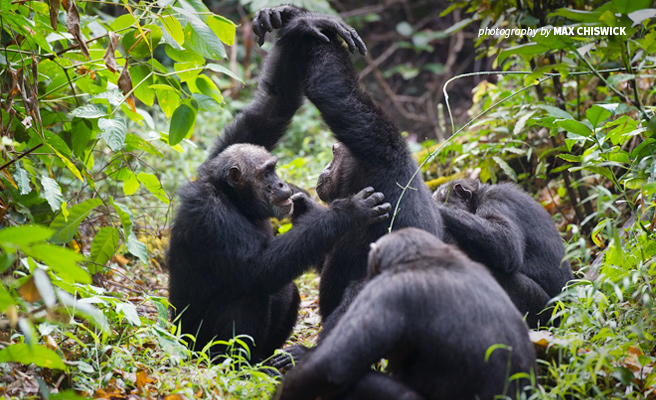A conservationist helps DRC’s forest communities fight COVID-19

For Dodo Tshidinda, a typical day at work looks nothing like what you might expect. Traversing hundreds of kilometers on a motorcycle deep in the Congo Basin rainforest is par for the course for Dodo, African Wildlife Foundation’s Program Officer in the Democratic Republic of Congo. So are days with no internet connectivity or phone signal.
As most of the world currently works from home and shelters in place due to the ongoing COVID-19 pandemic, 36-year-old Dodo has not slowed down but redoubled his efforts in service to his community.
Recently, he made a 1,312-kilometer round trip — 260 kilometers on a motorcycle and 1,052 kilometers by car — from Bili-Uele to Kisangani to deliver educational posters about COVID-19 to the communities living on the periphery of the expansive Bili-Uele Protected Area Complex.
Dodo notes that the devastating effects of the ongoing global pandemic are being felt even in a place as remote as Bili.
“Last month, food was almost impossible to find at local markets in Bili due to the restrictions and limitation of movement,” says Dodo. Interprovincial travel in the DRC is suspended in response to COVID-19, affecting wildlife conservation and community-based conservation activities as well. Dodo explains: “This has had an impact on the deployment of our anti-poaching patrols. The patrol at the end of April showed that there is an increase in poaching during the COVID-19 pandemic.”
In the Bili-Uele landscape, Dodo is tasked with implementing AWF’s conservation interventions in the Central African country. He might not be the first person to come to mind when you think about essential workers, but Dodo is doing much-needed work to ensure that the people in this remote rainforest have at least a basic layer of protection against COVID-19.

Dodo Tshidinda, AWF Program Officer in DRC, distributed educational posters to clinics in Bili-Uele to raise awareness about COVID-19
Transforming community conservation during a health crisis
Ordinarily, Dodo is responsible for providing technical and logistical support in the fight against illegal wildlife trade, habitat loss, and the overexploitation of natural resources. His duties now also include ensuring the health and wellbeing of the communities that he works with.
“Once the DRC government announced the COVID-19 protocols, including the closure of schools, universities, and churches and also asked that people respect the rules of hygiene and social distancing, we were worried because we are in an environment where strict compliance with all these measures by local communities is very difficult to understand and carry out. There was a lot of panic because beyond the daily stresses caused by insecurity due to the presence of armed rebel groups in the landscape, the community now also has to deal with COVID-19,” says Dodo.
Bili-Uele, where Dodo is based, is the largest complex of protected areas in northern DRC and is far removed from the country’s capital of Kinshasa. It lies nearly 586 kilometers from the third largest town of Kisangani and borders the Central African Republic. It is an under-developed region characterized by lack of governance, whose stability is further threatened by armed rebel groups known to kidnap and kill villagers, forcing communities to move deeper into the forest for safety.
Levels of poverty are high, and a lack of economic opportunities means that people disproportionately depend on natural resources for a living, with activities such as artisanal mining, subsistence hunting, and fishing prevalent in the region. Given this set of circumstances, the flow of information about COVID-19 and other happenings around the world is severely hampered. Along with the posters, Dodo and his team have also been teaching the community about the disease and the basic measures they can take to protect themselves and their families.
“The local community here in the village at Bili is finding it hard to comprehend what COVID-19 actually is. Most of the restrictions impact on an already hard way of life. We are in a community which is not sufficiently educated, and this presents a permanent danger to everyone in the event of infection because basic hygiene is poorly understood and not followed properly,” explains Dodo.

AWF's community--based conservation efforts in DRC's rainforests help conserve eastern chimpanzees and other vulnerable wildlife species
Anti-poaching activities continue to safeguard at-risk species
Bili-Uele is home to Africa’s biggest population of the eastern chimpanzee, as well as important populations of the forest elephant. But poaching rates are high and are a big threat to these species, which prompted AWF to establish a presence in the landscape in 2015. With support from the European Union, AWF has worked with the country’s wildlife authority, Institut Congolais pour la Conservation de la Nature (or ICCN) to set up a base for eco-guards within the complex to mitigate illegal wildlife trade.
The presence of eco-guards helps to ward off rebel groups, therefore providing security for the villages as well. Although this work continues during the pandemic, all community-based conservation efforts such as outreach programs, have been suspended to comply with government directives on social distancing.
“We avoid gatherings of more than 20 people, including parades and meetings, with our partners. However, our work in site surveillance, biomonitoring, and security patrols is ongoing in order to continue our fight against poaching while respecting preventive hygiene measures intended to prevent the [transmission] of COVID-19,” says Dodo.
He is hopeful that the pandemic will end soon so that the community can regain a sense of normalcy and jump-start suspended activities. But for now, Dodo is happy to hop on his trusty motorbike and do more sensitization campaigns. Whatever it takes to keep his community healthy.